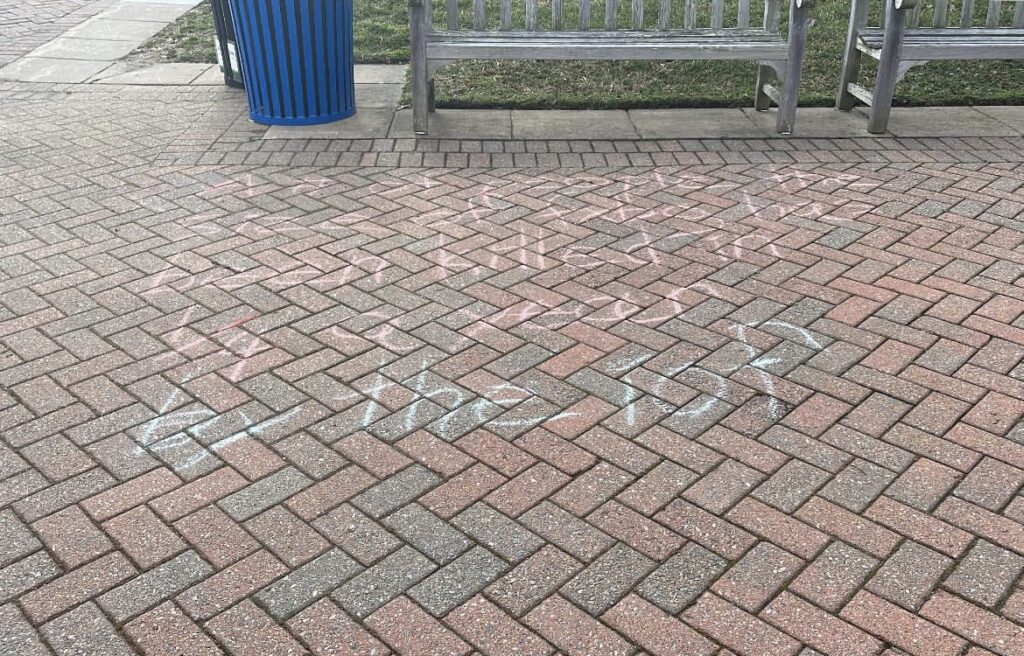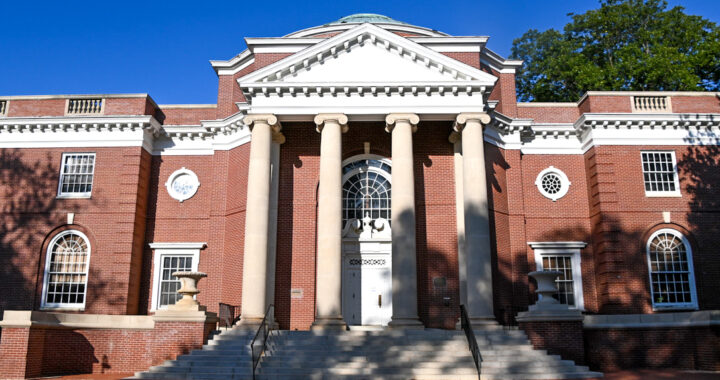Updates to the UMW student handbook include prohibition of chalking on brick and clarifications to the amnesty policy
4 min read
The UMW chalking policy has been updated so that chalk is not allowed on brick surfaces. | Claire Marshall Watkins, The Weekly Ringer
by MARTINA PUGH
Staff Writer
On Aug. 22, the University of Mary Washington announced new changes to the student handbook. The policies that have been changed include firmer regulations regarding chalking and the introduction of the amnesty policy, as well as additional changes to the student conduct process, hazing and the institution’s alcohol and drug policy.
A majority of the changes are intended to bring the handbook up to compliance with state law, which is not uncommon, as Juliette Landphair, the vice president of student affairs, points out.
“Changes to university policies and procedures happen every year and sometimes a few times a year depending on new federal and state mandates as well as emerging cultural and technological realities and trends,” she said. “For instance, the Mary Washington honor system existed long before the emergence of the internet; yet, as internet use expanded, the honor system had to take into account this emerging technology in the honor system’s processes and procedures.”
Despite annual updates, some students are still unaware that changes were made.
“I do not think I am aware of all the new changes to the student handbook,” said Olivia-Lena De Veaux, a junior international affairs and Spanish double major. “I think the university could be more proactive about communicating policy changes to students — not everyone reads such lengthy emails, assuming they’re even reading emails unrelated to Canvas notifications.”
However, Landphair says that a notification outlining any changes in policy is sent to all students when the handbook is updated, and that they are encouraged to read it closely. The recent notification emphasized the importance of familiarizing oneself with the policies as they are updated.
“Some policies and links have been updated with this latest edition of the handbook, so whether this is your first semester at UMW or you’ve been here many years, you’ll want to review the information,” it says. “It is the responsibility of every student to know and follow the policies outlined in the UMW Student Handbook along with federal, state, and local laws.”
Chalking
The updated handbook formally bans the use of chalk on all brick surfaces. In previous years, UMW students and campus organizations have utilized chalk as a means to get messages across to the student body in a timely and efficient way.
The new chalking policy now states that “chalking is permitted outdoors on non-brick, flat, horizontal surfaces (including the concrete borders of Campus Walk) and must be fully exposed so that rain can wash the water-soluble material away naturally.”
According to the 2020-2021 student handbook, the previous rules stated that chalking was limited to uncovered sidewalks and prohibited on covered surfaces, sides of buildings, stairs, porches, patios and tunnels. Only traditional chalk was permitted, any other materials were considered prohibited and students would be fined.
“We did change the chalking policy to include no chalking on brick,” said Landphair. “This decision results from the adverse effect of chalk on our brick surfaces (removing the chalk harms the brick) and is consistent with chalking policies at other public Virginia universities.”
Amnesty
The introduction of the amnesty policy—which is a reformed Safe Sammy—is meant to help students mediate safety while engaging in behavior that is against student conduct rules pertaining to alcohol and drug use. The Safe Sammy policy was introduced to maintain and promote student safety, however due to miscommunication, the policy became ineffective.
“I am aware of the Safe Sammy policy but I need clarification on how to use it,” said De Veaux.
This confusion is one of the primary reasons for its reform. The amnesty policy “addresses the risk of harm due to alcohol use, drug use, and hazing behavior. Informally referred to as “Safe Sammy” at UMW, this provision exists to encourage students to reduce the risk of harm and get help for themselves or other students in need of medical assistance,” according to the updated handbook.
Students also found that Safe Sammy was difficult to use in practice, as many believed they had to request use of the rule, instead of it existing as a permanent resource.
“The amnesty policy is similar to Safe Sammy where a student doesn’t have to invoke it but when the situation is being looked over by police and honor council the policy will be taken into account for a lesser punishment,” said junior environmental science major Kate Stoneman.
The policy relies on the student or witnesses to seek out assistance for medical help. This can come in the form of a call to an RA, UMW police or emergency services. The amnesty policy does not stop a student from being referred to the student conduct review board; however, their actions during this will be taken into consideration during their hearing and resolution process.This year, UMW also formally published a hazing prohibition policy and clarified definitions in the alcohol and drug policies. Specific language used in the handbook was shared with the campus community on Aug. 19 in a campus-wide email and can be found online.


